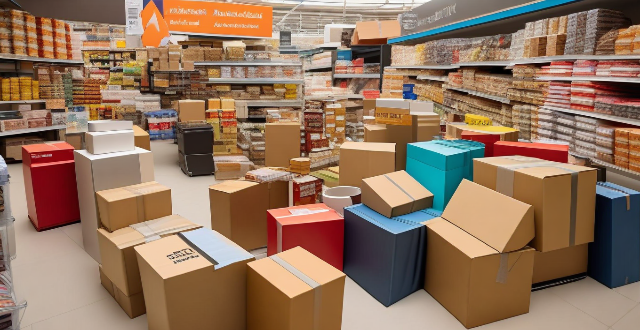Shopping Customs

What challenges do people face while shopping globally ?
Shopping globally can be an exciting experience, but it also comes with its own set of challenges. These challenges can range from language barriers to shipping delays and customs issues. In this article, we will discuss some of the most common challenges faced by people while shopping globally. One of the biggest challenges when shopping globally is the language barrier. Many online stores operate in different languages, which can make it difficult for shoppers to understand product descriptions, return policies, and other important information. This can lead to confusion and frustration, especially if there are no translation options available. Another challenge faced by global shoppers is shipping delays. Depending on the country you are shipping to, it can take several weeks or even months for your package to arrive. This can be frustrating if you need the item urgently or if it is a gift for someone else. Additionally, shipping costs can also be quite high, which can make the overall cost of the purchase more expensive. Customs issues are another challenge that global shoppers may face. When purchasing items from abroad, they may be subject to customs duties and taxes that can significantly increase the cost of the item. Additionally, some items may be prohibited from being imported into certain countries, which can result in them being confiscated at customs. Returning items purchased from international retailers can also be challenging. Many retailers have strict return policies that require the item to be returned within a certain time frame or only accept returns for certain reasons. Additionally, returning items can be expensive due to shipping costs and may take a long time to process. Currency conversion can also be a challenge when shopping globally. The exchange rate between currencies can fluctuate rapidly, which can make it difficult to determine the exact cost of an item in your local currency. This can lead to unexpected charges on your credit card statement or make it difficult to compare prices between different retailers. Finally, another challenge faced by global shoppers is limited product availability. Some products may not be available in certain countries or regions, which can limit your options when shopping online. Additionally, some retailers may not offer international shipping or may only ship to certain countries. In conclusion, shopping globally can come with its own set of challenges such as language barriers, shipping delays, customs issues, return policies, currency conversion, and limited product availability. However, with careful planning and research, these challenges can be overcome, allowing you to enjoy the benefits of shopping from around the world.

How do I avoid customs fees when buying from overseas ?
When purchasing goods from overseas, it's common to encounter customs fees, which can significantly increase the total cost of your purchase. However, there are several strategies you can use to minimize or avoid these fees altogether. Here's a detailed guide on how to do so: ## Understanding Customs Fees Customs fees are taxes imposed on imported goods by the government of the destination country. These fees are typically based on the value of the items being imported and may vary depending on the type of product and its classification under international trade regulations.### Key Points to Remember: - **Research Regulations**: Familiarize yourself with the customs regulations of the country you're importing goods into.- **Check Import Restrictions**: Some items may be prohibited or have specific requirements.- **Know the Thresholds**: Many countries have de minimis thresholds below which no customs duties are charged.## Strategies to Minimize Customs Fees### 1. Declare Lower Value Some countries offer a de minimis threshold, meaning that if the value of the goods is below a certain amount, no customs fees will be charged. Be cautious with this approach, as undervaluing goods can be considered a violation and may result in penalties.### 2. Use a Package Forwarding Service Package forwarding services allow you to ship your purchases to an intermediary address before sending them on to you. This can help by: - **Consolidating Packages**: Reducing the number of shipments can lower handling fees.- **Repackaging**: To make the package look less valuable.- **Value Declaration**: Some services may adjust the declared value to stay within de minimis limits.### 3. Shop at Online Stores That Offer Free International Shipping Many online retailers offer international shipping with customs fees included in the price or have agreements that reduce these fees.### 4. Consider Using an Import Broker Import brokers specialize in facilitating the clearance of goods through customs and can provide expert advice on minimizing fees. They have knowledge of customs laws and can assist with proper classification and valuation of goods.### 5. Check for Tax-Free Shopping Options Some countries offer tax-free shopping for tourists, which can be a way to avoid customs fees when bringing in goods personally.## Examples of Goods That May Incur Lower Customs Fees - **Personal Use Items**: Clothing, toiletries, and other personal use items often have lower customs fees.- **Unboxed or Opened Electronics**: Sometimes unboxed or opened electronics are subject to reduced customs fees.- **Gifts**: Sending items as gifts can sometimes result in lower customs fees, but this must be declared properly.## Tips for Successful Importing - **Keep Records**: Save all receipts and documentation related to your purchases.- **Stay Informed**: Customs policies can change, so stay updated on the latest regulations.- **Be Honest**: Always declare the true value and nature of your goods to avoid legal issues. By following these strategies and tips, you can effectively minimize or avoid customs fees when buying from overseas. However, always remember to comply with the laws and regulations of both the exporting and importing countries to ensure a smooth importing process.

Are there any cultural customs or traditions I should be aware of when traveling in Africa ?
When traveling in Africa, it is important to be aware of local customs and traditions to ensure a respectful and enjoyable experience. Key cultural customs and traditions include greetings and politeness, dress code, dining etiquette, religion and spirituality, as well as tipping and bargaining. By following these guidelines, travelers can immerse themselves in the rich cultures of Africa while respecting local traditions.

Is global shopping more convenient than local shopping ?
Global shopping, also known as cross-border e-commerce, has become increasingly popular in recent years. It allows consumers to purchase products from different countries and have them delivered to their doorsteps. However, is it really more convenient than local shopping? This article explores the advantages and disadvantages of global shopping and concludes that whether it's more convenient depends on various factors such as product availability, pricing, delivery times, shipping costs, and customs duties. While global shopping offers a wider range of products and potentially lower prices, it also comes with longer delivery times, higher shipping costs, and potential additional charges like customs duties. Therefore, consumers should carefully consider these factors before deciding which option is most convenient for them.

What are the potential risks involved in global shopping ?
Global shopping has become increasingly popular in recent years, but it comes with potential risks such as customs duties and taxes, longer shipping times and higher costs, quality assurance and product safety concerns, language barriers and customer service challenges, and currency exchange rate fluctuations. To mitigate these risks, consumers should research customs policies, choose reputable sellers, read product reviews, check return policies, consider insurance options, plan ahead for shipping times, monitor exchange rates, and use secure payment methods. By following these tips, consumers can enjoy a safe and satisfying global shopping experience.

What is a tax refund for shopping ?
The article provides a comprehensive guide on what a tax refund for shopping is, how it works, its benefits, and tips for successful claims. It explains that a tax refund for shopping allows tourists to reclaim some of the Value Added Tax (VAT) they have paid on purchases made during their trip abroad. The process involves keeping receipts, meeting minimum purchase amounts, obtaining tax-free forms, customs declaration, and claiming refunds. The article also highlights the benefits of tax refunds, including savings, additional discounts, and convenience, and offers tips for successful claims such as planning ahead, organizing documents, allowing enough time, and double-checking amounts.

What are the best practices for safe global shopping ?
Global shopping has become increasingly popular in recent years, with the rise of e-commerce platforms and international shipping options. However, it also comes with its own set of risks and challenges. To ensure a safe and secure global shopping experience, here are some best practices to follow: 1) Research the seller before making a purchase from an international seller. Look for reviews and feedback from other customers, and check the seller's reputation on trusted review sites like Trustpilot or ResellerRatings. 2) Use a secure payment method when shopping globally. Look for sellers that accept credit cards or reputable third-party payment processors like PayPal. Avoid using wire transfers or other unsecured payment methods. 3) Verify the shipping details before making a purchase. Check the estimated delivery time, shipping costs, and any customs fees that may apply. Choose a shipping option that includes tracking and insurance to protect your purchase during transit. 4) Be aware of customs regulations in both your home country and the seller's country. Some items may be prohibited or restricted, and there may be additional taxes or duties applied to your purchase. Make sure you understand these requirements before making a purchase to avoid any unexpected charges or delays. 5) Keep records of your global shopping purchases. Save copies of receipts, order confirmations, and any communication with the seller. These records can be helpful if there are any issues with your purchase or if you need to file a dispute with your payment provider or credit card company.

Are there any specific items that cannot be included in a tax-free shopping claim ?
Certain items may not qualify for tax exemption in tax-free shopping, including alcohol and tobacco products, perishable food items, medications and prescription drugs, firearms and weapons, and hazardous materials. The specific items that cannot be included in a tax-free shopping claim may vary depending on the country's customs regulations and policies.

What are the cultural differences to consider while shopping globally ?
This text provides a detailed summary of the key cultural differences to consider while shopping globally, including language barriers, negotiation styles, product selection, payment methods, and etiquette and customs. It emphasizes the importance of adapting to different communication styles, being prepared to negotiate prices, looking for local specialties, being aware of different payment methods, and respecting local customs and traditions. By considering these cultural differences, one can ensure a smoother and more enjoyable shopping experience while traveling globally.

How can one ensure the authenticity of products purchased from global shopping sites ?
When shopping online, especially on global platforms, itWhen shopping online, especially on global platforms, it the authenticity of purchased products examine product images carefully, check for authenticity indicators, understand return policies, use secure payment options, inquire about shipping and customs, and verify the product after receipt. Following these steps can reduce the risk of purchasing counterfeit products and provide peace of mind with online purchases.

Can global shopping bridge the gap between different cultures ?
Global shopping, or cross-border e-commerce, has become increasingly popular in recent years. It offers consumers the ability to purchase products from other countries without leaving their homes. However, there are both potential benefits and challenges associated with this trend when it comes to bridging cultural gaps. Benefits include increased exposure to foreign cultures through fashion, food, and home decor; promoting mutual understanding through shared interests in technology, sports, and entertainment; and encouraging cultural sensitivity and respect through handicrafts, holiday celebrations, and language learning tools. Challenges and limitations include issues related to shipping costs, customs regulations, language barriers, loss of local cultural identity due to overreliance on foreign products, and the potential for consumerism rather than genuine cultural exchange. Overall, while global shopping offers opportunities for cultural exchange and understanding, it is important to approach this trend with mindfulness and consideration for its potential impact on individual cultures and the broader global community.

Can I save money by shopping at duty-free stores when traveling abroad ?
Duty-free shopping can be a cost-effective way for travelers to purchase goods, offering tax-free prices and exclusive products. However, it's essential to consider potential drawbacks such as higher base prices, limited selection, and impulse buying. To make the most of duty-free opportunities, travelers should research beforehand, set a budget, and understand customs regulations. By doing so, they can potentially save money while enjoying the convenience of shopping at their travel destinations.

Can global shopping help in finding unique and rare products ?
Global shopping allows consumers to access a wide range of unique and rare products from diverse markets around the world. By expanding your shopping horizons beyond your local market, you increase your chances of discovering unusual items directly from manufacturers and artisans at potentially lower costs. To find these one-of-a-kind products through global shopping, research potential countries or regions known for producing desired items, use specialized search engines and directories, follow social media influencers and bloggers, and attend international trade shows and expos. However, challenges such as longer shipping times, higher costs, quality assurance, and ethical considerations must be taken into account.

What are the taxes and duties involved in global shopping ?
Global shopping popularity has grown, but understanding the taxes and duties involved is crucial for informed purchasing decisions. Types of taxes and duties include import duty, value added tax (VAT), customs clearance fee, and excise tax. To calculate these charges, one needs to know the product category, country of origin, value of goods, and local tax laws. The responsibility for payment can be on either the seller or the buyer, depending on the transaction terms. To avoid unexpected charges, research before buying, ask for a full cost breakdown, and consider using a package forwarding service.

What are the benefits of using a top-ranked online shopping site ?
Using a top-ranked online shopping site offers several benefits, including convenience and time-saving, access to a wide range of products, better deals and discounts, easy price comparison, secure payment options, availability of customer reviews and ratings, and hassle-free returns and exchanges. These advantages enhance your shopping experience by providing everything you need for a seamless and enjoyable shopping experience.

How can I save money while shopping during the discount season ?
This article provides practical tips for saving money during the discount season. It suggests making a list of essentials, setting a budget, researching before shopping, using coupons and promo codes, shopping with a friend, considering alternative brands, and being aware of return policies. These strategies can help shoppers avoid overspending and make informed purchasing decisions.

What role does mobile shopping play in the success of Double 11 Shopping Carnival ?
Mobile shopping has significantly contributed to the success of the Double 11 Shopping Carnival by increasing accessibility, providing personalized experiences, integrating social media, and offering omnichannel experiences.

What are the benefits of shopping at duty-free stores ?
Shopping at duty-free stores offers benefits including tax-free shopping, exclusive products, deals and discounts, convenient access, global brands, gift options, quality assurance, and currency exchange.

What are some trusted websites for finding online shopping deals ?
Finding reliable sources for online shopping deals is crucial in today's e-commerce landscape. Trusted websites such as retailer sites, coupon and cashback platforms, price comparison tools, and social media pages offer exclusive discounts and promotions. It is important to verify the legitimacy of these sites to ensure a secure shopping experience.

What are some effective ways to save money while shopping ?
Shopping can be enjoyable but also strain budgets. Effective ways to save money include making a shopping list, using coupons and promo codes, buying in bulk for non-perishable items, taking advantage of seasonal sales, comparing prices, and avoiding impulse buys. Planning ahead and setting a budget can help stick to necessary purchases and avoid overspending.

What documents are required to apply for a shopping tax refund ?
The text is a topic summary for "Required Documents for Shopping Tax Refund Application." It lists the necessary documents needed to apply for a tax refund, including a passport or travel document, receipts and invoices, a tax-free form, credit card or bank statement, boarding pass or flight itinerary, customs declaration form, and shipping documents (if applicable). The text also mentions that once all the required documents are gathered, the tax refund application can be made at the airport or through the designated tax refund office in the city where purchases were made.

Can you recommend a reliable shopping app with a wide range of products ?
The Amazon Shopping app is a reliable and comprehensive option for online shopping, offering a wide range of products, user-friendly interface, reliable shipping options, and excellent customer service. While there may be some drawbacks, such as the subscription fee for Prime membership, the overall benefits outweigh the cons.

What are the benefits of shopping through global online platforms ?
The text summarizes the benefits of shopping through global online platforms. The key advantages include increased access to products, competitive pricing, convenience, variety of payment options, easy price comparison, reviews and ratings, direct shipping, cross-border shopping, and environmental friendliness. These benefits make online shopping an attractive option for consumers around the world.

How do I avoid impulse buying and stick to my shopping list ?
The text provides tips on how to avoid impulse buying and stick to a shopping list. It emphasizes the importance of identifying needs, categorizing the list, setting a budget, not shopping when hungry, using cash instead of cards, avoiding window shopping, and practicing self-control. By following these steps, one can make conscious decisions about purchases and avoid overspending and clutter in the home.

What is the process of returning a product in global shopping ?
### Summary: Returning a product purchased through global shopping involves several steps, including checking the return policy, initiating the return process, preparing and shipping the item back, monitoring your refund, documenting the process, and considering international factors such as customs and currency exchange rates. It's important to stay organized, use trackable shipping methods, and keep records of all communications with the seller to ensure a smooth and effective return.

What are some tips for saving money while shopping ?
Saving Money While Shopping: Tips for Smarter Spending Shopping can be both enjoyable and costly. To save money while shopping, consider these tips: make a list before shopping, compare prices across different stores and online retailers, use coupons and discounts, buy in bulk (if applicable), avoid impulse purchases, and shop around holidays for sales. By following these strategies, you can stick to your budget, avoid overspending, and get the best deals possible.

How has the COVID-19 pandemic affected this year's Double 11 Shopping Carnival ?
The COVID-19 pandemic has significantly impacted the annual Double 11 Shopping Carnival, one of China's largest online shopping events. The event has seen an increase in sales due to a surge in online shopping as people stay at home. Consumer behavior has also changed, with many prioritizing essential items over luxury purchases. Sellers face challenges in managing inventory levels and adapting marketing strategies. Health and safety concerns have been raised, leading to measures such as contactless delivery and enhanced sanitation practices. Despite these challenges, the event has still generated record-breaking sales figures.

What are the best strategies for shopping during discount season ?
Shopping during discount season can be overwhelming and confusing. To make the most of your shopping experience, it is important to have a plan in place. Some strategies to consider include making a list, researching prices, checking store policies, using coupons and promo codes, shopping early or late, and considering online shopping. By following these strategies, you can save money and get the items you need without the stress and chaos of crowded stores.

What are some of the most secure online shopping platforms ?
Secure online shopping platforms are essential in protecting personal and financial information. Amazon, eBay, Walmart, Target, Best Buy, and Etsy are some of the most secure online shopping platforms available today. These platforms use advanced security measures such as SSL encryption and two-factor authentication to protect users' data. Additionally, they offer various payment options and excellent customer service. By choosing these reputable platforms, you can enjoy a safe and convenient online shopping experience.

How does global shopping change with holiday seasons ?
The holiday season significantly impacts global shopping trends, affecting consumer behavior, marketing strategies, and supply chain operations. Key changes include increased spending, a shift to online shopping, targeted advertising, adapted supply chains, evolving product demands, workforce adjustments, sustainability concerns, and digital transformation. Retailers must adapt to these changes to meet consumer expectations and maximize sales success.